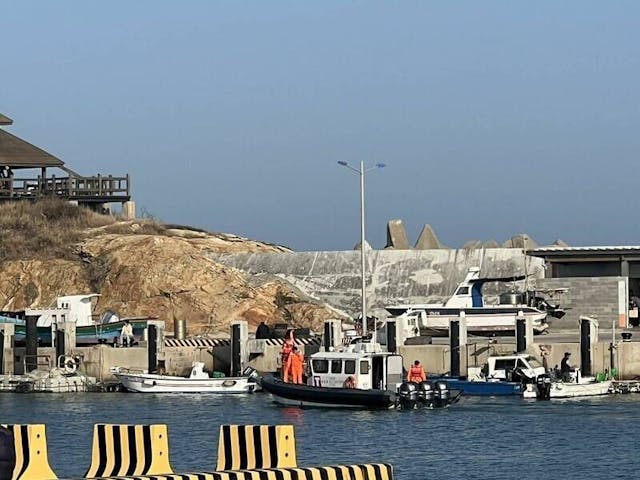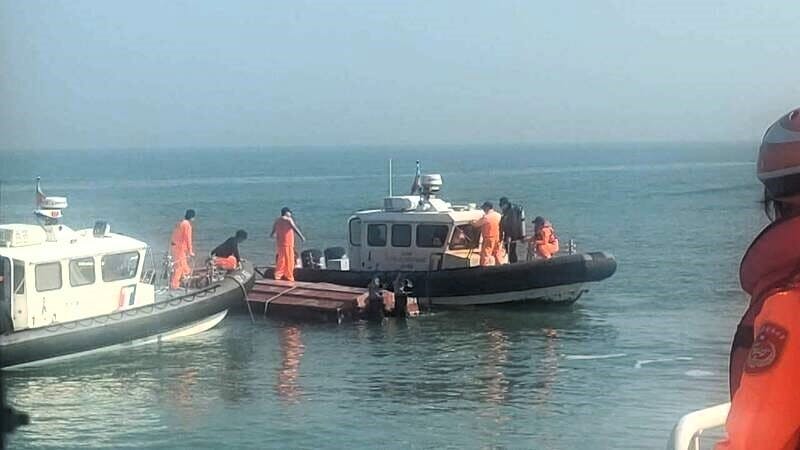2月14日,金門海巡隊追逐大陸漁船,當時這艘無名船漁船進入金門海域所謂「禁止」水域。根據台灣海巡署的版本,指漁船上的大陸漁民無視台方檢查要求,加速行駛,導致漁船翻覆,4名漁民落入水中,其中2人死亡。據悉,不治的兩名漁民來自四川,兩名生還的漁民來自重慶和貴州。根據新聞報道,兩名倖存者「情緒激動」,聽不懂閩南話。
有傳言指這4名漁民是試圖進入台灣的走私犯,但台灣官方表示,人口走私通常不會採取這樣的路線。
大陸反應強烈
金門縣紅十字會表示,將事件視為「海難」,可以迅速安排善後兩名遇難的大陸漁民,但台灣當局表示,將依照正常程序處理此事。這意味着,傳統上「越界」的大陸漁民會受到台灣海巡隊的查問,然後將案件提交金門檢察機關,之後大陸人可能被扣留,期限為3至5個月,最長不超過一年。
大陸方面對此事件反應強烈。國務院台辦發言人朱鳳蓮表示,中方對此表示哀悼,並向死者家屬表示深切慰問。國台辦指這是一宗「嚴重傷害兩岸同胞感情的惡性事件」,朱鳳蓮補充說,大陸方面歷來為台灣漁船和漁民提供避風、補給、搶險、救助等相關幫助。
針對大陸的言論,台灣陸委會表示,由於漁船沒有船名、沒有船舶證書、也沒有漁船登記,台灣海巡人員「依法執行職務,過程並無不當」。
根據台灣海巡署統計,2016年7月至2023年11月間,有9100多艘大陸漁船被「驅離」台灣海域。陸委會官員補充說,每當大陸漁船「闖入」台灣「禁止水域」0.86海浬,海巡署必「依法」採取行動攔截或驅離。
客觀地說,金門附近是否存在「禁止水域」有爭議,特別是自民進黨2016年5月上台以來,台灣與大陸的關係已不斷惡化。
近年來,愈來愈多的大陸船隻進入台灣周邊海域,有的採挖海底的沙石,有的從事捕魚活動,據報道,有的甚至排放垃圾,據台灣方面稱,這些垃圾必須處理。陸委會表示,大陸漁船「闖入」台灣海域,「嚴重損害台灣沿海漁民的利益和民生」。

台灣反應相對客氣
台灣陸委會主委邱太三表示,台灣和大陸方面「保持一定程度的接觸」,台方將全面調查並將於稍後通報對方。
他的言論對大陸方面來說,顯得相當客氣和有技巧。
金門縣縣長、民眾黨籍政治人物陳福海對這宗悲劇表示遺憾。他指示金門副縣長為生還者提供護理和行政協助。2月15日,陳福海呼籲海峽兩岸以「悲天憫人」的態度,就台灣與大陸漁民的生計和活動進行「理性、和平、務實的對話」。他舉例介紹了金門水產試驗所與廈門海洋發展局如何合作施放魚苗,以實現雙方漁業合作的雙贏。陳福海最後表示,金門縣府願以兩岸和平先行者的角色,持續為兩岸和平、對話溝通來盡更多的努力。
金門官員2月15日上午拜訪了金門漁民,要求他們保持克制,低調行事,避免不必要的衝突或糾紛。
金門縣立法委員陳玉珍表示,金門與廈門一水之隔,雙方都需要「智慧」來解決問題。
近幾周,兩岸關係惡化,民進黨終止台灣組團訪問大陸,大陸方面因更改靠近台海「中線」的M503航線而受到批評。觀察家稱,中國大陸並不承認這條「中線」的存在,特別是最近大陸戰機一直飛越「中線」。不過,大陸國台辦回應稱,M503航線屬於民航航線,變更航線為了緩解航班壓力,並保障相關空域及航線安全。
自2023年中期以來,伴隨着空域的爭端,台灣海巡署「驅離」更多大陸漁船的事件也愈來愈多。2023年7月12日,台灣海巡署以「闖入」金門海域捕魚為由逮捕了3名大陸漁民。5天後,海巡署以在澎湖海域「非法」捕魚為由,拘留了12名大陸漁民。2023年9月29日,另一艘大陸漁船前往台灣新竹西北海岸,17名漁民被扣留並送往台北接受調查。2023年11月9日,台灣海巡署在台中港沿岸一艘捕獲了近250公斤魚穫的船隻上扣留了13名大陸漁民。兩天後,6名大陸漁民在金門沿海「非法」捕魚被拘留。2024年1月12日,6名大陸漁民在澎湖海域一艘捕撈150公斤魚穫的漁船上被扣留。
管理大陸漁民方式須具建設性
顯然,未來幾個月甚至幾年,台灣海峽兩岸都需要以富有成效和具建設性的方式管理大陸漁民的活動。
根據《台灣地區與大陸地區人民關係條例施行細則》第42條規定(註),大陸船舶未經許可進入台灣地區「限制」或「禁止」水域,可被「驅離」並命令停船,實施檢查。第42條第四款甚至規定,如果大陸船舶拒絕停船或抗拒扣留,台方執法人員可予警告,警告無效後可以「射擊」。
如果是這樣,台方就有權力和自由裁量權來處理大陸漁船涉嫌「闖入」台灣海域的行為。諷刺的是,任何粗心或任意地行使第42條第四款賦予的權力,都可能使兩岸關係陷入突發的危機。
2015年3月,台灣立法院修改實施細則,將大陸船隻「非法進入」台灣海域的罰款由新台幣50萬元提高至新台幣100萬元以上、千萬元以下,處罰力度之大,既有趣又諷刺的是,提高罰款由國民黨立法委員主導的立法院通過。
或許,最近發生的海難事件的癥結,在於大陸方面是否承認這些海域屬於台灣方面。自2016年5月民進黨上台後,兩岸關係惡化,雙方一直以低調但可控的方式處理捕魚事件,不像最近發生的導致兩名大陸漁民死亡的悲劇。這一罕見且史無前例的事件需要雙方考慮建立有效的機制來應對。
這個機制可由雙方紅十字會管理或調解。由於紅十字會屬於非政府組織,台灣紅十字會建議台灣當局將最近的悲劇視為「海難」,不失為擺脫當前僵局的一條出路。雙方紅十字會也可以發揮調解人的作用,將台灣官方的調查結果和觀點傳達給大陸官方。
也許從長遠來看,雙方可以透過非政府組織和倡議團體來討論漁業糾紛、旅遊和學生交流等相對「低層政治」的問題。這些組織和團體也能更方便、更有效地傳達兩岸意見,成為以和平、和諧、建設性方式處理兩岸關係的有益管道。
分割低層、高層政治
如果民生問題屬於「低層政治」,兩岸關係或許可以在中短期內聚焦於民生問題的具體細節,從而在不觸及任何「高層政治」問題的情況下,使兩岸關係升溫。
這次事件的另一個重要意義是,金門縣包括縣長和非政府機構,都熱衷於充當台灣和大陸之間的橋樑。因此,金門可以成為進一步試驗非政府層級相互對話的地方。
總而言之,最近發生的兩名大陸漁民在金門海域死亡的悲劇,為紅十字會等非政府組織打開了大門,在彌合海峽兩岸溝通鴻溝方面發揮日益重要的作用。在雙方政府溝通已經受到高層政治阻礙的情況下,非政府組織、倡議團體和個人的作用仍然發揮着至關重要的中介作用,對兩岸關係可以產生潛在穩定、建設性和有效和平影響。此外,金門作為靠近廈門的地方,可以在民間對話和新的實驗中發揮關鍵作用,以縮小雙方的溝通距離。因此,非政府層面的團體和個人,尤其是金門的團體和人士,應該被鼓勵在未來的幾個月和幾年裏,在「低層政治」層面上就民生議題交流和對話。
Kinmen’s fishing vessel tragedy and its implications for Cross-Strait Relations
A recent tragedy involving the death of two mainland fishermen in an unnamed mainland fishing vessel off the coast of Kinmen is politically significant, for the incident has highlighted how the Taiwan and mainland sides are managing it with implications for cross-strait relations in the coming years.
The Taiwan coastguard chased the mainland fishing boat on February 14 when the unnamed vessel entered the so-called “prohibited” waters off the coast of Kinmen. According to the Taiwanese coastguard version of the story, the mainlanders on board of the fishing boat ignored the Taiwan side’s request for inspection and they speeded up, leading to the capsize of the boat. Four fishermen fell into the waters and two of them died. It was reported that the dead fishermen were from the Sichuan province, while the two alive fishermen came from Chongqing and Guizhou. The two survivors, according to news reports, were “emotional” and could not understand the Min Nan (Hokkien) dialect.
There was a rumour saying that the four fishermen were smugglers trying to reach the Taiwan territory, but the Taiwan official side remarked that human smuggling usually did not utilize such a route.
The Kinmen Red Cross suggested that the two dead mainlanders can be managed quickly by treating the incident as “a marine disaster.” But the Taiwan authorities said that the incident would be managed in accordance with proper procedures. This means that, traditionally, mainland fishermen who crossed the “boundaries” have been inspected by the Taiwan coastguard, which then submits the case to the Kinmen prosecution authority after which the mainlanders can be detained in prison between three to five months and not longer than one year.
The mainland Chinese side reacted strongly to the incident. Zhu Fenglian, a spokesperson of mainland China’s Taiwan Affairs Office, said that the Chinese side expressed its sorrow and sent its condolences to the families of the dead, and that the incident was “hostile” and “hurt the sentiment of the compatriots on both sides of the strait.” Zhu added that the mainland side has traditionally aided the Taiwanese fishermen who sought logistical supplies and security.
In response to the mainland remarks, the Taiwan side’s Mainland Affairs Council said that the Taiwanese coastguard managed the tragedy properly because the fishing boat had no name, no shipping license, and no registered port.
According to the Taiwan coastguard statistics, there were 9,100 mainland fishing vessels which allegedly had to be “expelled” from the Taiwan waters from July 2016 to November 2023. An official of the Mainland Affairs Council added that whenever a mainland fishing boat “intrudes” into the “prohibited zone” for 0.86 nautical miles, then a Taiwanese coastguard vessel must take action to stop or pursue it.
Objectively speaking, it is disputable whether there is a “prohibited” maritime zone near the Kinmen island, especially as the relations between the Taiwan and mainland sides have deteriorated since the Democratic Progressive Party (DPP) came to presidential power in May 2016.
In recent years, more mainland vessels have entered the nearby waters surrounding Taiwan, some of them extracting sand from the ocean floor, some engaging in fishing, and some reportedly even releasing garbage that, according to the Taiwan side, had to be tackled. The Mainland Affairs Council has stated that the “intrusion” of mainland fishing vessels into the Taiwan waters has “seriously undermined the interests and livelihood of the Taiwan fishermen and residents in the coastal regions.”
Chiu Tai-san, the minister of the Mainland Affairs Council of the Taiwan government, said that both the Taiwan and mainland sides “maintain a certain degree of contact” while his side will investigate fully and inform the other side later.
His remarks appeared to be quite skilful and courteous toward the mainland side.
Chen Fu-hai, the magistrate at the Kinmen county and an “independent” politician without any party affiliation, expressed his regret over the tragedy. He instructed his deputy magistrate in Kinmen to provide care and administrative assistance to the survivors. On February 15, Chen Fu-hai appealed to both sides of the strait to adopt a “benevolent” attitude toward “a rational, peaceful and pragmatic dialogue” over the livelihood and activities of the fishermen from Taiwan and the mainland. He gave an example of the cooperation between the Kimen Fishing Products Experimental Institute and the Xiamen Oceanic Developmental Bureau on how to distribute fish seeds with a view to achieving a win-win situation for the fishing industry from both sides. Chen concluded that the Kinmen county is willing to play a pioneer role in bridging the communication gap between the two sides of the strait.
The Kinmen officials on the morning of February 15 visited the Kinmen fishermen, asking them to exercise restraint and adopt a low profile in their action for the sake of preventing any unnecessary conflict or dispute.
Chen Yu-jen, a Kuomintang (KMT) member of the Legislative Assembly representing the Kinmen county, said that Kinmen and Xiamen are separated by a short distance of waters and that both sides need “wisdom” to solve the problem.
In recent weeks, cross-strait relations have become sour as the DPP terminated the Taiwan tours to visit the mainland, while the mainland side was criticized for changing a flight path of M503 route that is close to the “median line” in the Taiwan strait. Mainland China does not recognize the existence of this “median line,” according to observers, especially as mainland warplanes have been flying over it recently. However, the mainland’s Taiwan Affairs Office responded by saying that the M503 route is for civil aviation and that the path change aims at alleviating congestion and protecting safety in the related airspace and routes.
The dispute over airspace has been accompanied by more incidents surrounding the “expulsion” of more mainland fishing vessels by the Taiwan coastguard since mid-2023. On July 12, 2023, the Taiwan coastguard arrested three mainland fishermen for “trespassing” the Kinmen waters to catch fish. Five days later, the coastguard detained twelve mainland fishermen for “illegally” catching fish off the coast of Penghu. On September 29, 2023, another mainland fishing vessel went to the northwest coast off Taiwan’s Hsinchu, where seventeen fishermen were detained and sent to Taipei for investigation. On November 9, 2023, the Taiwan coastguard detained thirteen mainland fishermen in a vessel that caught almost 250 kilograms of fish off the coast of the Taichung port. Two days later, six mainland fishermen were detained off the coast of Kinmen where they “illegally” caught fish. On January 12, 2024, six mainland fishermen were detained in a mainland fishing vessel where they caught 150 kilograms of fish off the coast of Penghu.
Clearly, the two sides of the Taiwan strait need to manage the activities of mainland fishermen in a productive and constructive way in the coming months and years.
According to Article 42 of the Implementation Details of the Relations of the People between the Taiwan region and Mainland region[1], the mainland vessels which enter the Taiwan region’s “restricted” or “prohibited” waters without permission can be “expelled” and inspected. Article 42 (4) even states that if the mainland vessels refuse to stop or resist to being detained, the Taiwan side’s coastguard may warn and “shoot” after warnings without effectiveness.
If so, the Taiwan side has the authority and discretion to deal with the mainland fishing vessels that allegedly “intrude” into Taiwan’s waters. Ironically, any careless or arbitrary exercise of the authority empowered by Article 42 (4) can and will plunge cross-strait relations into a sudden crisis.
In March 2015, the Taiwan Legislative Assembly amended the Implementation Details and increased the fines on those mainland vessels “illegally entering” Taiwan waters from NT$500,000 to over NT$1 million but not more than NT$10 million – a tough penalty that was interestingly and ironically passed by a legislature dominated by KMT legislators.
Perhaps the crux of the problem for the most recent fishing tragedy is whether the mainland side recognizes those waters belonging to the Taiwan side. Since cross-strait relations have deteriorated after the DPP came to presidential power in May 2016, both sides have been dealing with fishing incidents in a low-profile and yet manageable way, unlike the most recent tragedy that unfortunately led to the deaths of two mainland fishermen. This rare and unprecedented incident calls for both sides to consider an effective mechanism in dealing with it.
This mechanism can be managed or mediated by the Red Cross from both sides. Since Red Cross belongs to a non-governmental organization, the suggestion from the Taiwan Red Cross for the Taiwan authorities to treat the most recent tragedy as a “maritime disaster” can be a way out of the current impasse. The authorities of the Red Cross from both sides can also function as the mediators, channelling the findings and views from the official Taiwan side to the mainland official side.
Perhaps a long-term implication for both sides to discuss issues of relatively “low-level politics,” such as fishing disputes, tourism, and student exchanges, can be conducted through non-governmental organizations and interest groups. These organizations and groups can and will channel the views from the two sides more conveniently and effectively, serving as a useful conduit to tackle cross-strait relations in a peaceful, harmonious, and constructive way.
If livelihood issues belong to low-level politics, cross-strait relations can perhaps focus on the nuts and bolts of such matters in the short run and medium term, thereby warming mutual relations without touching upon any issue of “high politics.”
Another important implication of the ongoing incident is that the Kinmen county, including its magistrate and non-governmental bodies, is keen to act as a bridge between the Taiwan and mainland sides. As such, Kinmen can and will likely be the place for further experimentation with mutual dialogue at a non-governmental level.
In conclusion, the most recent tragedy involving the death of two mainland fishermen off the coast of Kinmen has opened the door to the increasingly vital role of non-governmental organizations, like the Red Cross, in bridging the communication gap between the two sides of the Taiwan strait. At a time when the governmental communications of both sides have already been hampered by high-level politics, the role of non-governmental organizations, interest groups and individuals is yet playing a crucial intermediary that will likely have potentially stabilizing, constructive, productive, and peaceful impacts on cross-strait relations. Moreover, Kinmen as a place close to Xiamen can and will play a critical role in non-governmental dialogue and new experiments that will bridge the communication gap between the two sides. As such, groups and individuals at a non-governmental level, especially in Kinmen, can and should be encouraged to exchange their views and dialogue over livelihood issues at the level of “low politics” in the coming months and years.
[1] For details, see https://db.lawbank.com.tw/FLAW/FLAWQRY03.aspx?lno=42-44&lsid=FL016529&_gl=1*1fq92kz*_ga*MzMzNTE4NTY5LjE3MDc5NzIyMjk.*_ga_92YN8QGDF5*MTcwNzk3MjIyOC4xLjAuMTcwNzk3MjIyOC42MC4wLjA, access date: February 16, 2024.
原刊於澳門新聞通訊社(MNA)網站,本社獲作者授權轉載。原文網址:http://tinyurl.com/bb2ec47c







































